Demolition Contractors Rochester
Find the best Demolition Contractor in Rochester
Receive 3 FREE Demolition Company Near Me quotes for your project today! Compare profiles, reviews, accreditations, portfolio, etc... and choose the best offer.

Premier Groundworks LLC
4.610 reviewsSouthfield, Michigan, USPremier Groundworks LLC Your trusted excavating contractor, hardscape installer, pond builder, and more! Call today to see what we can do for you. Serving all of Southeast Michigan. Premier Groundworks LLC offers beautiful commercial landscape design and other property maintenance and construction services throughout the Southeastern Michigan area. As a creative and professional commercial service, we handle build projects that include all aspects of industrial and commercial landscaping design, construction, plant installation, snow plowing, excavating and more. The commercial landscaping design experts at Premier Groundworks offer design and build services for many properties including: Residential community/Subdivision developments Parks and community centers Retail and office centers Health care facilities Religious organizations and institutions Municipalities Colleges and universities Small business complexes and many more. Commercial Excavating & Land Sculpting Premier Groundworks is a one-stop design-build company, specializing in sustainable and practical landscaping for commercial and residential projects. No matter the scope of excavating, or the property sculpting needs you require, Premier Groundworks can handle the task. We have the capabilities, experience, and creativity to exceed your expectations. Professional Commercial Landscaping Premier Groundworks plans and provides for successful completion of your commercial landscaping project through site analysis, budget proposals, and implementation. This is an essential key to a successful project.
- Services
- Why Us?
- Gallery
Get Quote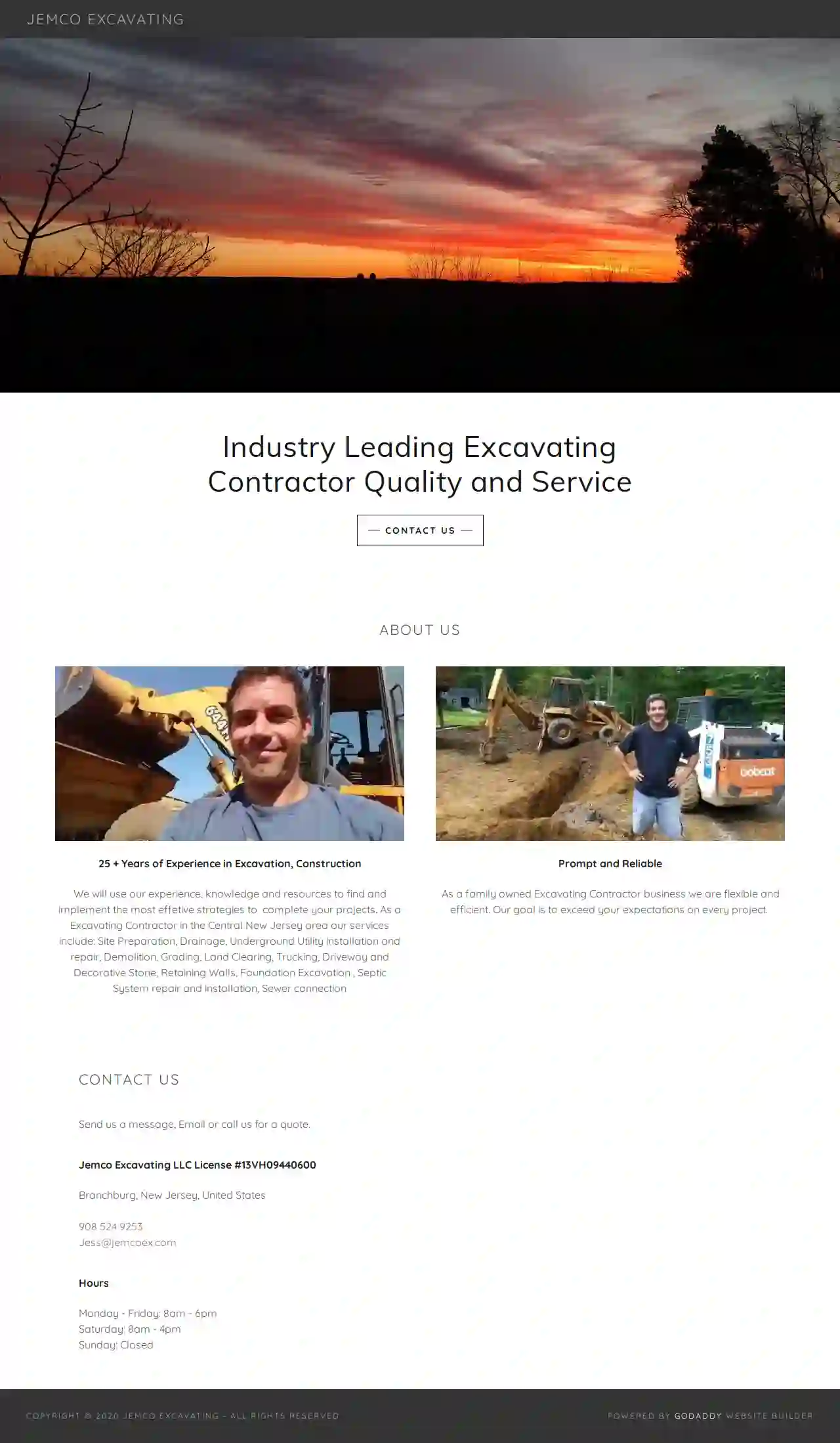
Jemco Excavating LLC
53 reviewsBranchburg, New Jersey, United States, USIndustry Leading Excavating Contractor Quality and Service Jemco Excavating is a family owned and operated excavating contractor with over 25 years of experience in the Central New Jersey area. We are committed to providing our clients with the highest quality service and workmanship. We will use our experience, knowledge and resources to find and implement the most effective strategies to complete your projects. Our services include: Site Preparation Drainage Underground Utility installation and repair Demolition Grading Land Clearing Trucking Driveway and Decorative Stone Retaining Walls Foundation Excavation Septic System repair and installation Sewer connection We are prompt and reliable, and our goal is to exceed your expectations on every project.
- Services
- Why Us?
- Gallery
Get Quote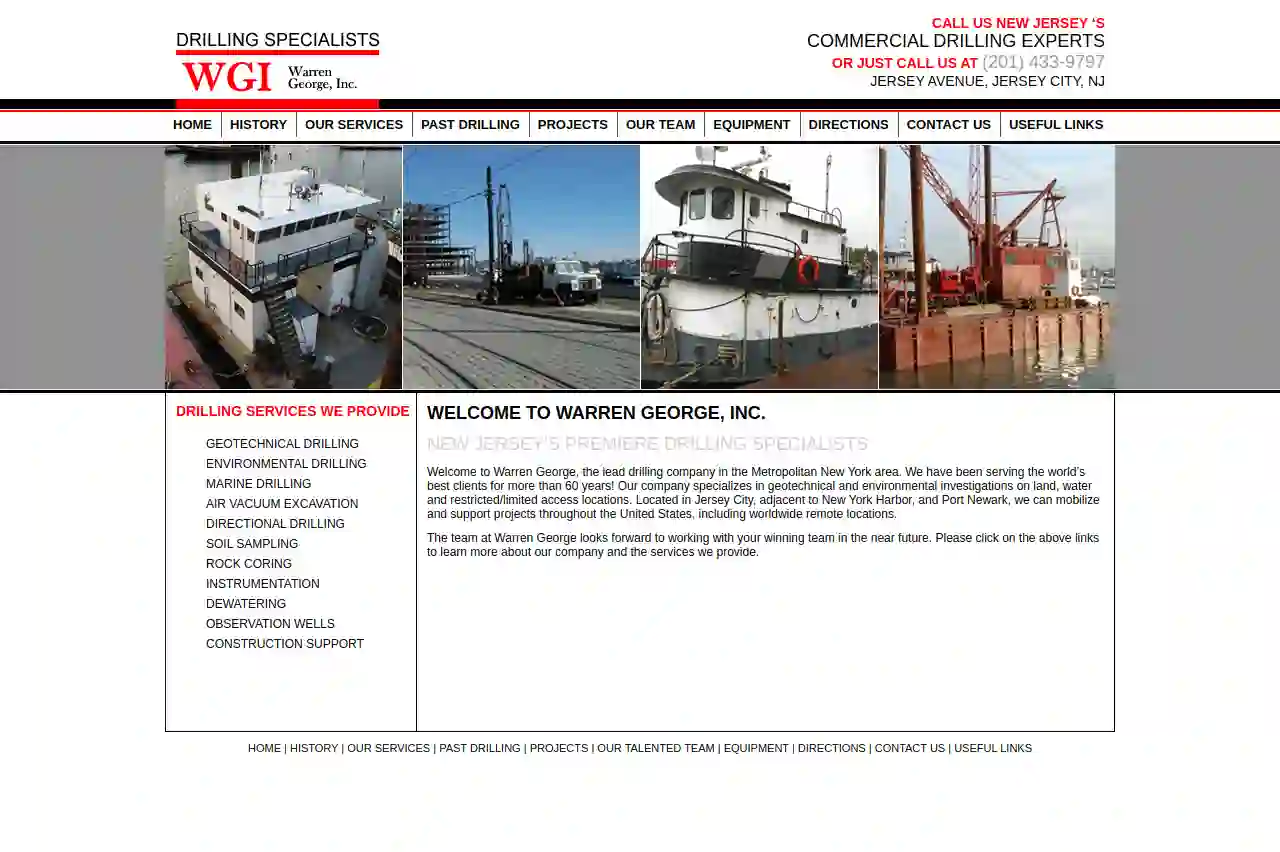
WARREN GEORGE, INC.
3.716 reviewsJersey Avenue, Jersey City, NJ, USWelcome to Warren George, INC. New jersey’s Premiere Drilling specialists Welcome to Warren George, the lead drilling company in the Metropolitan New York area. We have been serving the world’s best clients for more than 60 years! Our company specializes in geotechnical and environmental investigations on land, water and restricted/limited access locations. Located in Jersey City, adjacent to New York Harbor, and Port Newark, we can mobilize and support projects throughout the United States, including worldwide remote locations. The team at Warren George looks forward to working with your winning team in the near future. Please click on the above links to learn more about our company and the services we provide.
- Services
- Why Us?
- Our Team
- Gallery
Get Quote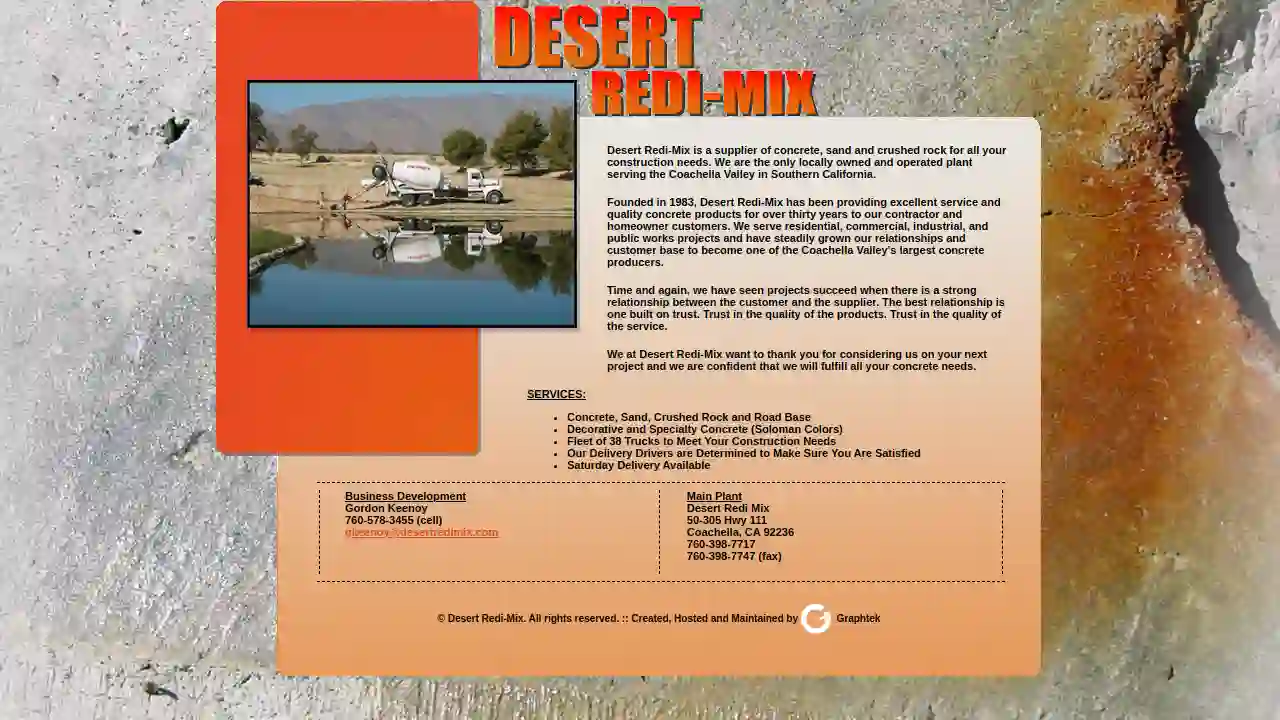
Desert Redi-Mix
34 reviews50-305 Hwy 111, Coachella, USDesert Redi-Mix: Your Trusted Coachella Valley Concrete Supplier Desert Redi-Mix is your go-to source for high-quality concrete, sand, and crushed rock in the Coachella Valley. We're a locally owned and operated company with over 30 years of experience serving the construction needs of homeowners and contractors alike. Since 1983, we've built a reputation for excellence, providing reliable service and top-notch concrete products. We cater to residential, commercial, industrial, and public works projects, and our commitment to customer satisfaction has made us one of the Coachella Valley's leading concrete producers. We understand that successful projects rely on strong partnerships. That's why we prioritize building trust with our customers. Trust in the quality of our products. Trust in the quality of our service. Thank you for considering Desert Redi-Mix for your next project. We're confident in our ability to meet all your concrete needs.
- Services
- Why Us?
- Our Team
- Gallery
Get Quote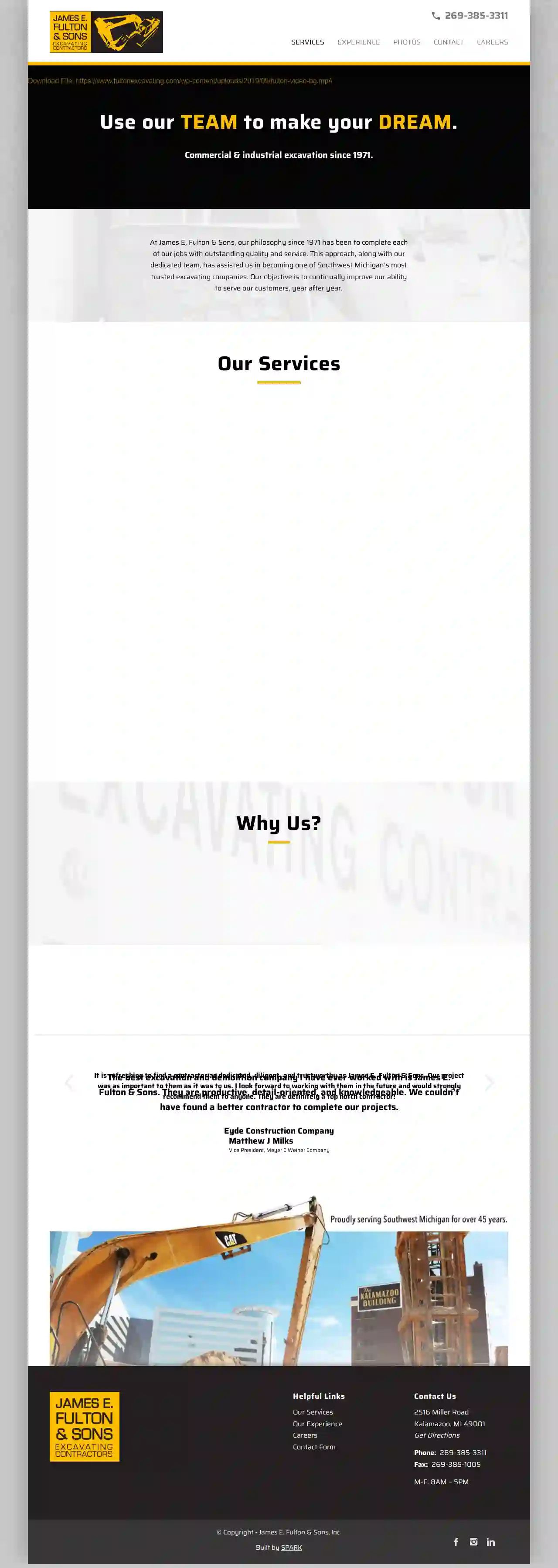
James E Fulton & Sons Inc
3.513 reviews2516 Miller Road, Kalamazoo, 49001, USUse our TEAM to make your DREAM. James E. Fulton & Sons has been providing Southwest Michigan with trusted excavating services since 1971. Our team is dedicated to completing each project with outstanding quality and service. We are committed to continually improving our ability to serve our customers, year after year. Why Choose Fulton Excavating? James E. Fulton & Sons has contributed to the growth of Kalamazoo and the surrounding region. We know the dirt business. Over the decades, we have been providing the community with land construction and excavation services. Our team of highly skilled and organized professionals is well-equipped to handle all of your commercial and industrial needs. Our Commitment to Excellence 100% Committed to Safety Fully Trained and Certified A+ Rated Insured & Fully Bonded Fully Knowledgeable in Prevailing Wage Licensed and MDOT Qualified We Strive to Be the Best!
- Services
- Why Us?
- Testimonials
- Gallery
Get Quote
Roto-Rooter Plumbing & Water Cleanup
4.7523 reviewsGulfport, USNeed a Plumber in Gulfport: Call Roto-Rooter Today for a Plumber in Gulfport Roto-Rooter plumbers in Gulfport provide full service plumbing maintenance and repairs and clogged drain cleaning, 24 hours a day, including toilet repairs. Roto-Rooters Gulfport plumbers offer residential and commercial plumbing services that customers depend on for all of their local plumbing needs. Trusted and recommended since 1935, Roto-Rooter is the premier provider of plumbing and drain cleaning services in Gulfport, MS. Homeowners and businesses depend on Roto-Rooter 24 hours a day, 7 days a week. Our specialty is emergency services. We stand by our estimates and guarantee our work. Your call will be answered by a trained customer service representative who will handle your request quickly and schedule service at your convenience. Learn About Our Trusted Services If you need plumbing work, call Roto-Rooter Plumbing and Drain Service to receive professional service from experienced and certified plumbers. Local plumbers in your area
- Services
- Why Us?
- Testimonials
- Gallery
Get Quote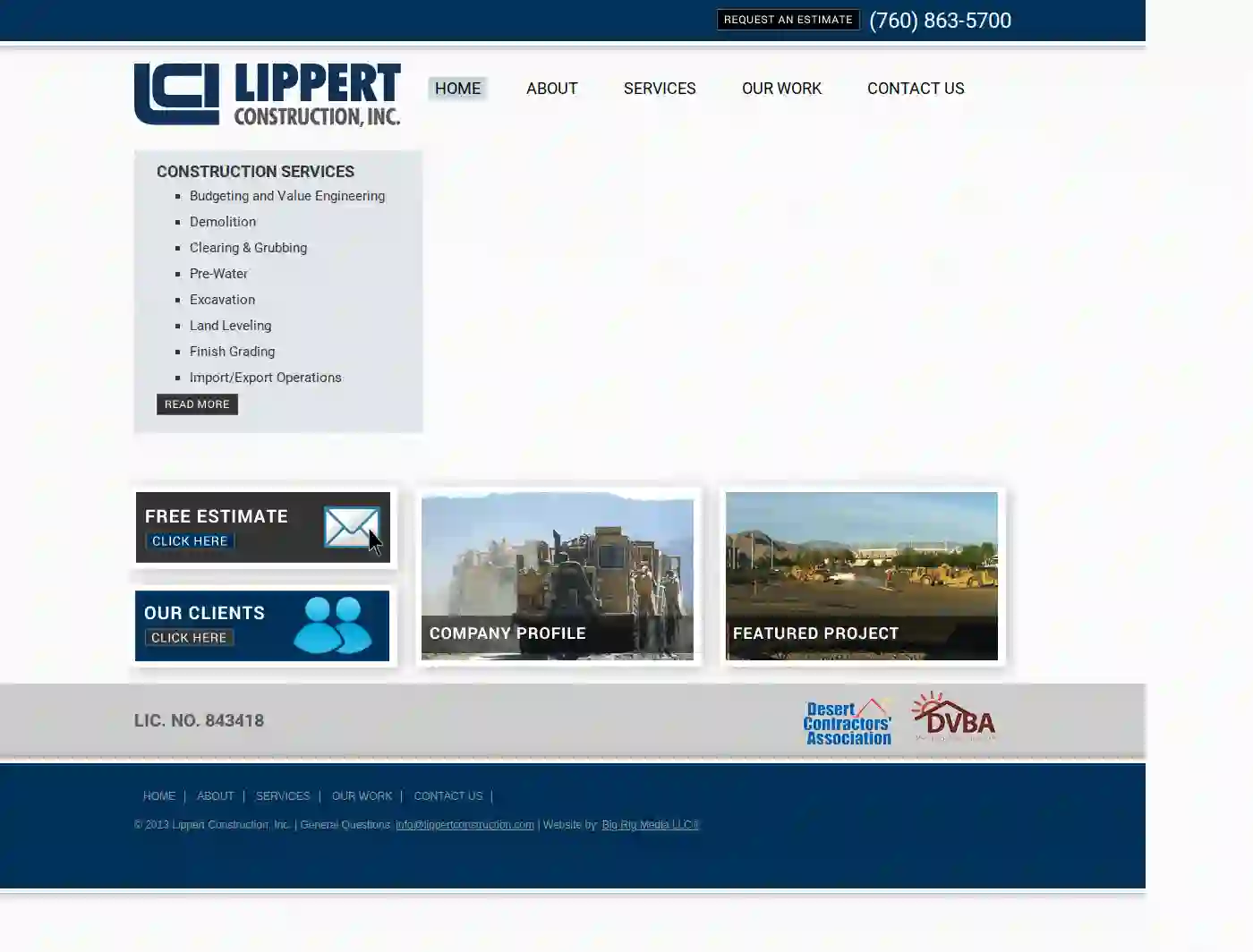
Lippert Construction
11 reviewsTroy, USLippert Construction: Your Trusted Partner for Construction Grading Lippert Construction, Inc. (LCI) is a leading provider of superior construction grading operations in the Coachella Valley. We have a proven track record of delivering high-quality results on time and within budget, earning us the trust of Southern California's premier builders and developers. Our commitment to safety is paramount. We are CPR, first aid, and AQMD certified, ensuring a secure and responsible work environment for our team and the community. With extensive experience in the Coachella Valley, we bring a deep understanding of the local landscape and regulations. Whether you need a single lot house pad, a commercial/retail center, or a large-scale subdivision or golf course project, LCI has the expertise and resources to handle any size job. We are dedicated to providing exceptional service and exceeding your expectations. Our team of skilled professionals is committed to delivering the highest quality workmanship and ensuring your project is completed to your exact specifications.
- Services
- Why Us?
- Gallery
Get Quote
Fantastic Lawns - Landscaping, Excavating, Snow & Ice Removal
4.973 reviewsHolt, 48842, USFantastic Lawns: Your One-Stop Shop for Outdoor Needs Fantastic Lawns, founded by Tom Flood, is your trusted partner for all your lawn, landscape, and snow removal needs. With years of experience and the latest in lawn care technology, we provide exceptional service to both residential and commercial customers in the Greater Lansing area. Our mission is simple: to deliver outstanding customer service and satisfaction, using our expertise to help you get the most out of your outdoor space. We offer a wide range of services to meet your specific needs, all at affordable prices. We treat your property as if it were our own, taking pride in every detail. Located in Holt, MI, just outside Lansing city limits, our convenient location ensures fast and easy access to the entire Greater Lansing area. We are committed to providing hassle-free service, going the extra mile to ensure your complete satisfaction. We use top-of-the-line Scag brand commercial grade mowers and have the latest equipment and technology to deliver exceptional results. Whether you need regular lawn maintenance, a complete landscape makeover, or reliable snow removal, Fantastic Lawns is your solution. Contact us today for a free quote and let us help you create a beautiful and functional outdoor space you can enjoy year-round.
- Services
- Why Us?
- Our Team
- Gallery
Get Quote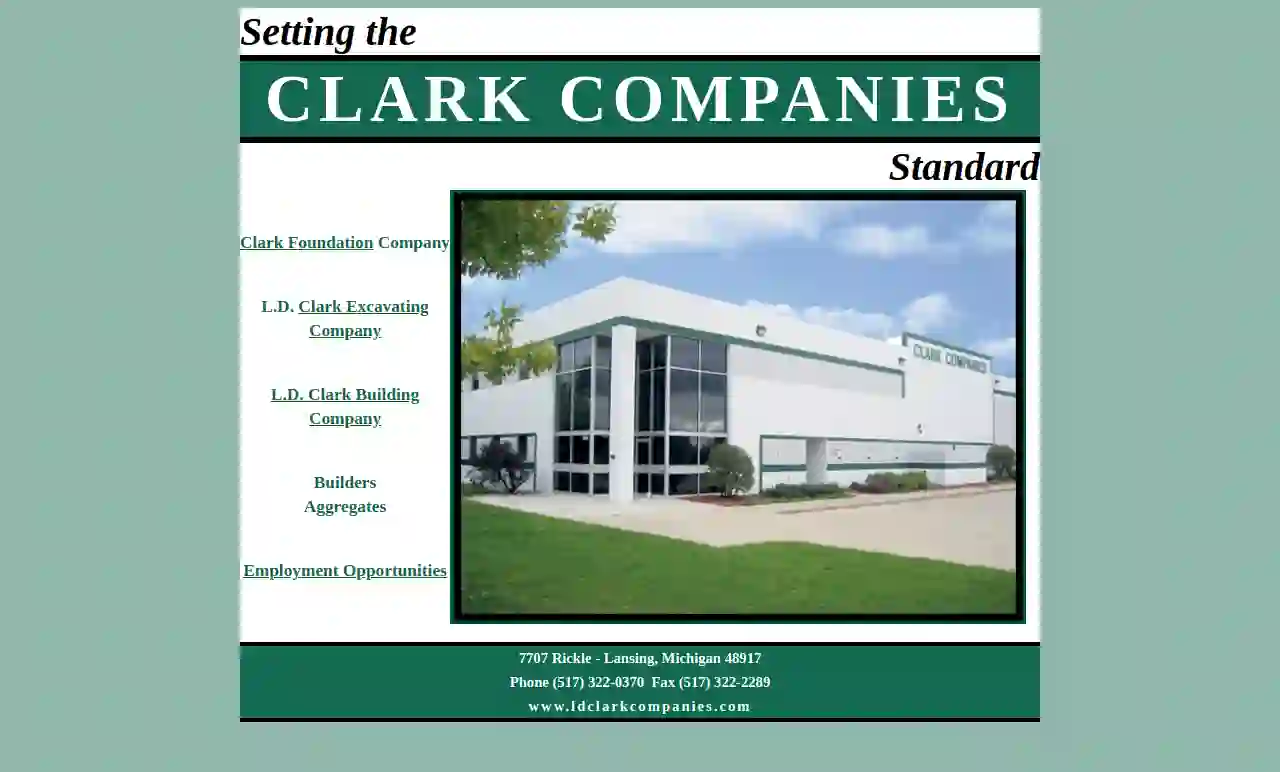
L D Clark Excavating Co
4.33 reviews7707 Rickle, Lansing, 48917, USL.D. Clark Companies: Building Your Future L.D. Clark Companies is a family-owned and operated business with a rich history spanning over 40 years. Founded in 1975 by Larry Clark, our company has grown into a trusted name in the Lansing, Michigan area, known for its commitment to quality, integrity, and customer satisfaction. Our Mission Our mission is to provide our clients with exceptional construction services, exceeding expectations with every project. We strive to build lasting relationships with our customers, earning their trust through our dedication to excellence and unwavering commitment to their vision. Our Services L.D. Clark Companies offers a comprehensive range of construction services, including: Excavating Grading Trucking Foundation Building Aggregates Our Team Our team is comprised of experienced and dedicated professionals who are passionate about their craft. We believe in fostering a collaborative environment where every team member contributes to the success of each project. Our commitment to continuous learning and professional development ensures that our team remains at the forefront of industry best practices. Our Experience L.D. Clark Companies has a proven track record of delivering successful projects for both residential and commercial clients. We have a deep understanding of the local market and are committed to providing our clients with the highest quality construction services at competitive prices.
- Services
- Why Us?
- Testimonials
- Gallery
Get Quote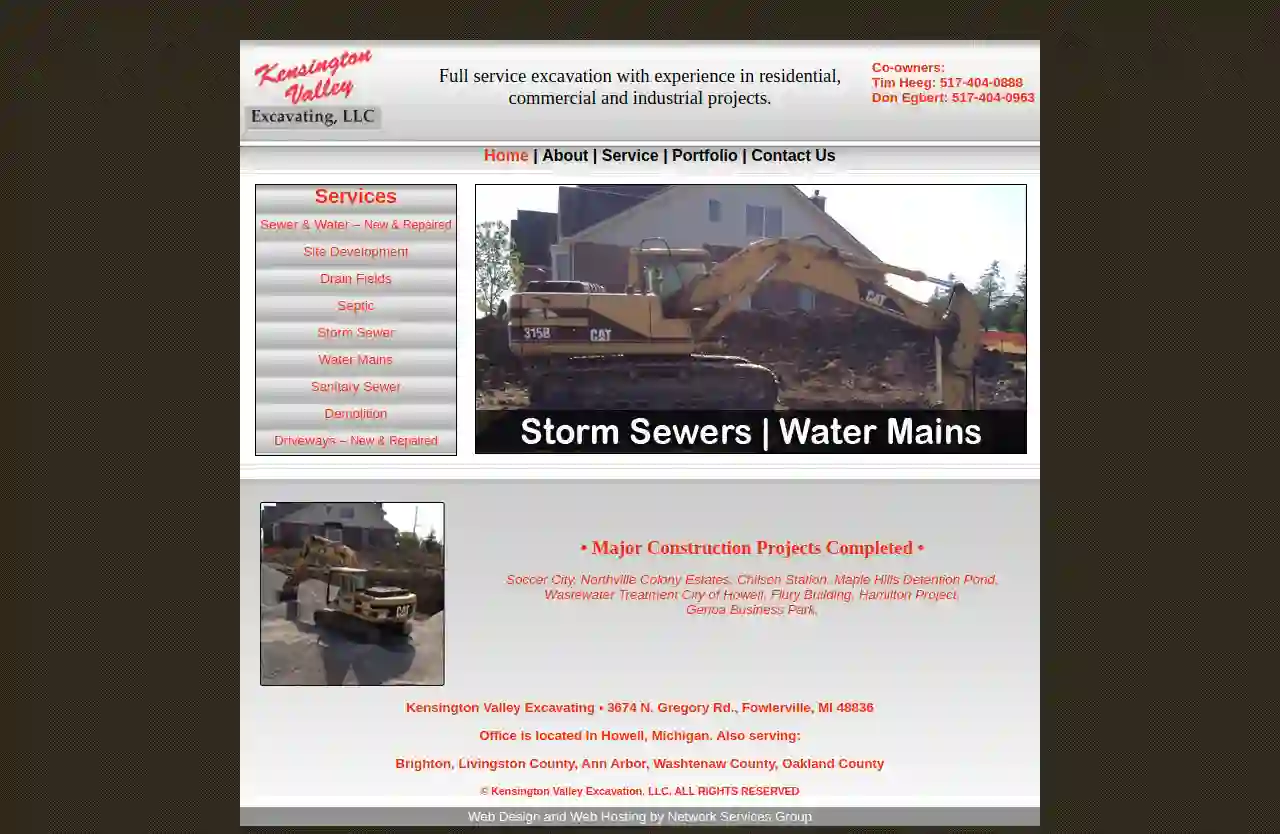
Kensington Valley Excavating, LLC
32 reviews3674 N. Gregory Rd., Fowlerville, 48836, USAbout Kensington Valley Excavating Kensington Valley Excavating, LLC is your one-stop shop for all your excavating needs. We are a locally owned and operated business based in Howell, Michigan, with years of experience in the industry. We specialize in providing comprehensive excavation services for residential, commercial, and industrial projects. Our team is committed to delivering high-quality workmanship and exceptional customer service. We are proud to be a full-service excavator, offering a wide range of services, including: Our Expertise: Sewer and water – New and Repaired Site Development – Building Pads, Parking Lots Drain fields Septic – Traditional, Engineered Storm Sewer Water Mains Sanitary Sewer Demolition Driveways – New and Repaired We are dedicated to providing our clients with the best possible experience. Our owners are actively involved in every project, ensuring that it is completed to the highest standards. We also have a team of experienced professionals who are committed to safety and efficiency. Our Advantages: Locally owned and operated Owners work on-site at each project Owners each have 15+ years experience in excavating We are proud of our track record of successful projects, including: Our Projects: Toll Brothers – various subdivisions including Island Lake (Novi), Maple Lakes (Milford), Northville Hills (Northville), Steeplechase (Northville) Contact us today for a free estimate. We would be happy to discuss your excavating needs and provide you with a personalized solution.
- Services
- Why Us?
- Our Team
- Gallery
Get Quote
Over 22,076+ Excavation Companies onboarded
Our excavation experts operate in Rochester and surroundings!
ExcavationHQ has curated and vetted the Best Excavation Businesses near Rochester. Find a reliable business today.
Frequently Asked Questions About Demolition Contractors
- Clear the Site: Remove all furniture, appliances, personal belongings, and any valuable items from the structure.
- Secure the Perimeter: Fence off the demolition area to prevent unauthorized access and protect surrounding property.
- Disconnect Utilities: Arrange for the disconnection of electricity, gas, water, and other utilities servicing the building.
- Hazardous Material Abatement: If asbestos, lead paint, or other hazardous materials are present, have them professionally removed before demolition begins.
- Notify Neighbors: Inform your neighbors about the demolition schedule to minimize disruptions and address any concerns.
- Obtain Permits: Ensure all necessary demolition permits are in place before starting work.
- General Liability Insurance: Covers bodily injury or property damage to third parties caused by the contractor's negligence.
- Workers' Compensation Insurance: Provides benefits to workers injured on the job.
- Pollution Liability Insurance: Covers costs associated with environmental contamination caused by demolition activities.
- Professional Liability Insurance: Protects against claims of negligence or errors in professional services, such as demolition planning or consulting.
- 'Can I see proof of your licensing and insurance?' Verify their credentials and coverage.
- 'What experience do you have with projects like mine?' Ensure they have relevant expertise.
- 'Can you provide references from past clients?' Check their reputation and customer satisfaction.
- 'What are your safety protocols?' Prioritize contractors who emphasize safety.
- 'How will you handle hazardous materials?' Ensure they have proper procedures for asbestos or lead abatement.
- 'What is your timeline for completing the project?' Understand the project duration.
- 'How will you manage noise, dust, and debris?' Discuss mitigation measures for minimizing disruption.
- 'What are your payment terms?' Clarify payment schedules and any required deposits.
How do I prepare my property for demolition?
What is the importance of insurance in demolition projects?
What is asbestos abatement?
What questions should I ask a demolition contractor before hiring them?
How do I prepare my property for demolition?
- Clear the Site: Remove all furniture, appliances, personal belongings, and any valuable items from the structure.
- Secure the Perimeter: Fence off the demolition area to prevent unauthorized access and protect surrounding property.
- Disconnect Utilities: Arrange for the disconnection of electricity, gas, water, and other utilities servicing the building.
- Hazardous Material Abatement: If asbestos, lead paint, or other hazardous materials are present, have them professionally removed before demolition begins.
- Notify Neighbors: Inform your neighbors about the demolition schedule to minimize disruptions and address any concerns.
- Obtain Permits: Ensure all necessary demolition permits are in place before starting work.
What is the importance of insurance in demolition projects?
- General Liability Insurance: Covers bodily injury or property damage to third parties caused by the contractor's negligence.
- Workers' Compensation Insurance: Provides benefits to workers injured on the job.
- Pollution Liability Insurance: Covers costs associated with environmental contamination caused by demolition activities.
- Professional Liability Insurance: Protects against claims of negligence or errors in professional services, such as demolition planning or consulting.
What is asbestos abatement?
What questions should I ask a demolition contractor before hiring them?
- 'Can I see proof of your licensing and insurance?' Verify their credentials and coverage.
- 'What experience do you have with projects like mine?' Ensure they have relevant expertise.
- 'Can you provide references from past clients?' Check their reputation and customer satisfaction.
- 'What are your safety protocols?' Prioritize contractors who emphasize safety.
- 'How will you handle hazardous materials?' Ensure they have proper procedures for asbestos or lead abatement.
- 'What is your timeline for completing the project?' Understand the project duration.
- 'How will you manage noise, dust, and debris?' Discuss mitigation measures for minimizing disruption.
- 'What are your payment terms?' Clarify payment schedules and any required deposits.